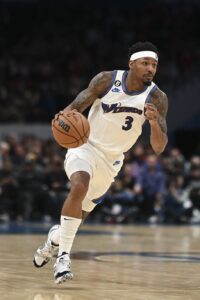No-trade clauses are rare in the NBA, since a player must meet a specific set of criteria in order to qualify for one. And even those players who become eligible may not have the leverage to demand a no-trade clause, which significantly limits a team’s flexibility in future trade negotiations.
 To be eligible to negotiate a no-trade clause, a player must have at least eight years of NBA experience and has to have spent at least four years (not necessarily the most recent four years) with his current team. He also must be signing a free agent contract, rather than an extension.
To be eligible to negotiate a no-trade clause, a player must have at least eight years of NBA experience and has to have spent at least four years (not necessarily the most recent four years) with his current team. He also must be signing a free agent contract, rather than an extension.
[RELATED: Hoops Rumors Glossary: No-Trade Clause]
Bradley Beal is the only NBA player who currently has a no-trade clause in his contract. The presence of that clause limited his trade market this past offseason when the Wizards sought to move him and helped steer him to a preferred destination (Phoenix) for a relatively modest return.
Although Beal is the only player who has an explicit no-trade clause, there are several others who will have implicit no-trade clauses in 2023/24, giving them the ability to veto trades during the current league year.
A player who re-signs with his previous team on a one-year contract – or a two-year deal with an option year – is given no-trade protection, unless he agrees to give up that protection when he inks his deal. That group doesn’t include players on two-way contracts, but it does include players who accept standard (non two-way) one-year qualifying offers.
A player who signs an offer sheet and has that offer matched by his previous team also has the ability to veto a trade for a full calendar year.
With those criteria in mind, here are the players who must give their consent if their teams want to trade them during the ’23/24 league year:
Players with a no-trade clause:
- Bradley Beal (Suns)
Players whose offer sheets were matched:
- Paul Reed (Sixers)
- Matisse Thybulle (Trail Blazers)
Players re-signing for one year (or two years, with a second-year player/team option):
- Thanasis Antetokounmpo (Bucks)
- Miles Bridges (Hornets)
- Jae Crowder (Bucks)
- DeAndre Jordan (Nuggets)
- Damion Lee (Suns)
- Kevin Love (Heat)
- Markieff Morris (Mavericks)
- Josh Okogie (Suns)
- Mason Plumlee (Clippers)
- Russell Westbrook (Clippers)
If any player who re-signed for one year approves a trade during the 2023/24 league year, he’ll have Non-Bird rights at season’s end instead of Early Bird or full Bird rights.
A handful of players with veto rights consented to trades during the 2022/23 season, including Mike Muscala, Serge Ibaka, Ryan Arcidiacono, and Kessler Edwards. Muscala and Edwards eventually had their team options for ’23/24 picked up, so their Bird rights – only lack thereof – didn’t come into play this summer. Ibaka and Arcidiacono, meanwhile, were waived before season’s end, meaning they didn’t enter the offseason with any form of Bird rights anyway.
Any player who approves a trade will retain his veto ability on his new team, and would have to consent to any subsequent deal during the 2023/24 season.
The following players were re-signed to one-year contracts (or two-year deals with an option year), but agreed to give up their right to veto a trade in 2023/24:
- Deonte Burton (Kings): Waived
- Taj Gibson (Wizards): Waived
- Montrezl Harrell (Sixers): Waived
- Reggie Jackson (Nuggets)
- Alex Len (Kings)
- Sandro Mamukelashvili (Spurs)
- Boban Marjanovic (Rockets)
- D’Angelo Russell (Lakers)
- Moritz Wagner (Magic)